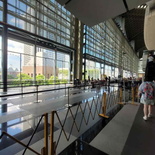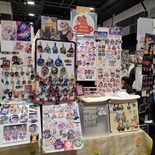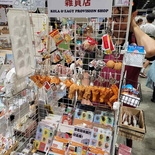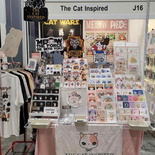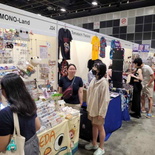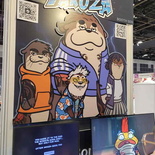Doujin Market 2025, or Doujima, is back again this weekend at Suntec Singapore Convention & Exhibition Centre. This year’s edition celebrates Doujima’s 11th edition. The event spanned 3 halls from Suntec’s hall 403 to 405, hosting over 600 creators from 15 countries, with a primary focus on Singapore creators.

The event is brought to you by event management company, the Neo Tokyo Project. The atmosphere buzzed with energy, drawing fans of anime, manga, games, and illustration. Is it worth up to the hype? Let’s take a walkthrough an explore.

More spacious convention floor layout
Notably, Doujima is this year replicated their tried and tested layout from last year’s Doujin Market 2024 event. It improves on the queuing and rearrange the halls with a larger walking aisles. Still, there is nothing new in the organisation in this year’s Doujin market.

Though, the walkways are much wider this year. Even with each block having 5 rows of stalls, there were lots of ample walkway space. Here. patrons browsing stores on both sides won’t obstruct traffic on the walkways. There is also a game booth stretch at the center with a large table top gaming area. More on that later.

Also, navigating the event was straightforward, thanks to clear signages and an organized layout. Booths were arranged in alphabetical rows, and information boards assisted in locating specific creators. Bringing cash was advisable, as some foreign vendors accepted only cash payments. Though this makes up the minority, with almost all booths accepting QR Paynow.

What’s in store
Upon entry, you encounter rows of booths showcasing an array of merchandise. Stickers, keychains, prints, crochet and zines filled the tables, reflecting both original works and fan art. Popular themes included Genshin Impact, Zenless Zone zero and old-school Pokémon.

It is not uncommon to see tables decked top to bottom with rows of standees, keychains and pins. Notably, you can recognise a number of them from last year’s Doujima as well as the Artbox market place at Singapore Expo earlier this year.

Also, garage kit models are an interesting find here, with a booth by ImpFoxter selling custom figures of their characters. Blulious has a booth offering Japanese-inspired omamori good luck charms. Interestingly, while some booths offered unique creations, others featured similar motifs, making the experience a tad repetitive at times.


There were a couple of stores notably selling locally inspired trinkets. Examples includes those by Kedai Kopi jacktus, and Kola and Eagy provision shop with their food themed store provisions.

Also, it is not uncommon for sellers to share booths, which brings the table costs down. It is not uncommon to see booth tables packed to the brim top to bottom with merchandise.

Interestingly, the Heng Suay eating house store offers keychains and towels themed after old-school Singapore mainstay items from an era-bygone, like parking coupons, and Translink card machines.


Moreover, Cosplayers added vibrancy to the event, with attendees dressed as characters from various franchises. Notably cosplayers were mostly seen doing photo-taking on the third-floor open spaces and not within the paid halls itself. The central hall provided open spaces for cosplay photography, accommodating both casual and professional shoots.

Actual Doujin’s this year

You can’t call Doujima a Doujin Market without the presence of Doujin’s (self-published comics). I am pleased to report that proper Doujins on sale at the event this year. Notably past Doujins market, this year has a handful or about 3-5 different booths selling a mix of thin comics and self-published books.

Additionally, there are art schools here such as 3D sense media school for instance offering sessions provided valuable insights for those looking to break into the creative industry. There are also several stores selling tools of the trade. Examples include Pentel drawing pens and affordable drawing tablets by XD Pen for productivity.

Gaming zone
A notable larger addition this year was the Indie Games Zone, presented in collaboration with SGGA, the Singapore Games Association. It is located at the center of Hall 404 in the heart of the convention floor.

Here, you could try out nine indie titles, such as Otter Yakuza due for a year-end demo release, Broccoli bunny studios detective game, and PixelEmm Perfect bowl food game. These playable demos provided a hands-on experience, allowing you to engage directly with developers.
Moreover, the Tabletop play space is one that invites you to participate in activities like Dungeons & Dragons sessions, miniature painting, and board game demos by Geekified games. This area fostered interaction and offered a break from the bustling marketplace.

Beating the queues
With a 12-noon opening time on Saturday till 8pm, the first day, queues were stated to form since 9am, with most of the sort-after merchandise sold within 4 hours of the first day. However, the venue became crowded by midday, with queues forming at popular booths. This of course won’t be an issue if you are just roaming about, popping by for a visit or don’t have anything in particular in-mind.
The crowds are notably a lot more bearable on the 2nd day of the event, Sunday. Unlike last year, there were no queues spilling out onto the 3rd floor areas. It is recommended to arrive on the second day as Sunday queues at the 11am opening has less than a 10-minute wait. Crowds are generally the highest from noon onwards, where patrons will start streaming in after lunchtime till 7pm Sunday closing.
Furthermore, tickets cost $11.45 per person for a Day Pass, comprising of the $10 ticket fee and a $1.45 booking fee on Eventbrite. Two-day weekend pass cost $18. Tickets are only available exclusively online with no physical ticket sales or walk-in purchases at the door. Though you can simply buy your tickets on the spot online too. You collect your bands on the spot before putting them on before headed into the compound. I find the ticket pricing reasonable compared to similar events like Anime Festival Asia, and not as pricey as that of the Singapore Comic con, costing twice as much. Also, you enter via hall 403 and exit out at hall 405. Security allows en-retry with the wristband. Bag checks are random with larger bags having to go through security checks.
Wrapping up
All in all, that wraps up our visit of Doujin Market 2025. You are good for 2 hours tops here at Doujin market, and probably longer if you were to check out every single store. The event offers a comprehensive showcase of pop culture-inspired art and creativity. While certain areas could benefit from more diversity in themes, the event provided ample opportunities for engagement, networking, and appreciation of independent creators. I find the event a staple in Singapore’s pop culture events, whether you were there to shop, learn, or simply enjoy the atmosphere.

